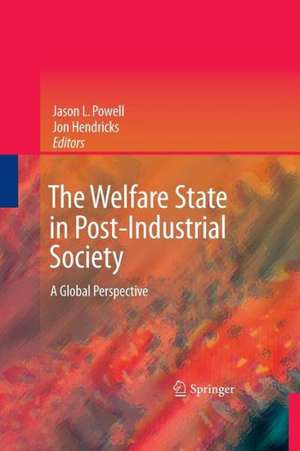The Welfare State in Post-Industrial Society: A Global Perspective
Autor Jason L. Powell, Jon Hendricksen Limba Engleză Paperback – 11 sep 2014
The Welfare State in Post-Industrial Society is divided into two major sections: the first draws from a number of leading social welfare researchers from diverse countries who point to the nation-state as case studies; highlighting how it goes about establishing and revising social welfare provisions. The second portion of the volume then moves to a more global perspective in its analysis and questioning of the impact of globalization on citizenship, ageing and marketization.
The Welfare State in Post-Industrial Society seeks to encourage debate about the implications of the most pressing social welfare issues in nation-states, and integrate analyses of policy and practice in particular countries struggling to provide social welfare support for their needy populations.
| Toate formatele și edițiile | Preț | Express |
|---|---|---|
| Paperback (1) | 948.61 lei 6-8 săpt. | |
| Springer – 11 sep 2014 | 948.61 lei 6-8 săpt. | |
| Hardback (1) | 954.77 lei 6-8 săpt. | |
| Springer – 22 iun 2009 | 954.77 lei 6-8 săpt. |
Preț: 948.61 lei
Preț vechi: 1156.84 lei
-18% Nou
Puncte Express: 1423
Preț estimativ în valută:
181.51€ • 189.53$ • 149.89£
181.51€ • 189.53$ • 149.89£
Carte tipărită la comandă
Livrare economică 15-29 aprilie
Preluare comenzi: 021 569.72.76
Specificații
ISBN-13: 9781489983060
ISBN-10: 1489983066
Pagini: 384
Ilustrații: VIII, 375 p.
Dimensiuni: 155 x 235 x 20 mm
Greutate: 0.54 kg
Ediția:2009
Editura: Springer
Colecția Springer
Locul publicării:New York, NY, United States
ISBN-10: 1489983066
Pagini: 384
Ilustrații: VIII, 375 p.
Dimensiuni: 155 x 235 x 20 mm
Greutate: 0.54 kg
Ediția:2009
Editura: Springer
Colecția Springer
Locul publicării:New York, NY, United States
Public țintă
ResearchDescriere
In recent years, major social forces such as: ageing populations, social trends, migration patterns, and the globalization of economies, have reshaped social welfare policies and practices across the globe. Multinational corporations, NGOs, and other international organizations have begun to influence social policy at a national and local level. Among the many ramifications of these changes is that globalizing influences may hinder the ability of individual nation-states to effect policies that are beneficial to them on a local level. With contributions from thirteen countries worldwide, this collected work represents the first major comparative analysis on the effect of globalization on the international welfare state.
The Welfare State in Post-Industrial Society is divided into two major sections: the first draws from a number of leading social welfare researchers from diverse countries who point to the nation-state as case studies; highlighting how it goes about establishing and revising social welfare provisions. The second portion of the volume then moves to a more global perspective in its analysis and questioning of the impact of globalization on citizenship, ageing and marketization.
The Welfare State in Post-Industrial Society seeks to encourage debate about the implications of the most pressing social welfare issues in nation-states, and integrate analyses of policy and practice in particular countries struggling to provide social welfare support for their needy populations.
The Welfare State in Post-Industrial Society is divided into two major sections: the first draws from a number of leading social welfare researchers from diverse countries who point to the nation-state as case studies; highlighting how it goes about establishing and revising social welfare provisions. The second portion of the volume then moves to a more global perspective in its analysis and questioning of the impact of globalization on citizenship, ageing and marketization.
The Welfare State in Post-Industrial Society seeks to encourage debate about the implications of the most pressing social welfare issues in nation-states, and integrate analyses of policy and practice in particular countries struggling to provide social welfare support for their needy populations.
Cuprins
I: Rethinking Social Welfare in a Post-Industrial World.- The Welfare State in Post-industrial Society: The Lay of the Land.- Social Quality in Post-industrial Societies: The Growth of Migrant Remittances in International Social Welfare.- Aging in Post-industrial Societies: Intergenerational Conflict and Solidarity.- Social Welfare, Aging, and Globalization in a Post-industrial Society.- In Search of a New Welfare State in Europe: An International Perspective.- Gender, Marriage, and Family in Post-industrial Society: An International Perspective.- Health and Health Care in Post-industrial Society.- Post-industrial Society and Aging in a Global World: The Demographic Context of Social Welfare.- On the Road to Welfare Markets: Institutional, Organizational, and Cultural Dynamics of a New European Welfare State Settlement.- II: Social Welfare in Post-Industrial Societies: International Comparisons.- A Nordic Welfare State in Post-industrial Society.- Citizenship and Education in Post-industrial Societies.- England and Wales: The Criminal Justice System in ‘Post-industrial Society’.- Canada: New Ideology and Social Assistance in Post-industrial Society.- United States: Social Welfare Policy and Privatization in Post-industrial Society.- Australia: Contemporary Issues and Debates on the Social Welfare System.- South Africa and Post-industrialism: Developmental Social Welfare – A Policy Framework for Social Services with Children.- Privatization Trends in Welfare Services and Their Impact upon Israel as a Welfare State.- South Korea: Balancing Social Welfare in Post-industrial Society.
Textul de pe ultima copertă
In recent years, major social forces such as: aging populations, social trends, migration patterns, and the globalization of economies, have reshaped social welfare policies and practices across the globe. Multinational corporations, NGOs, and other international organizations have begun to influence social policy at a national and local level. Among the many ramifications of these changes is that globalizing influences may hinder the ability of individual nation-states to effect policies that are beneficial to them on a local level. With contributions from different countries worldwide, this collected work represents the first major comparative analysis on the effect of globalization on the international welfare state.
The Welfare State in Post-Industrial Society is divided into two major sections: the first draws from a number of leading social welfare researchers from diverse countries who point to the nation-state as case studies; highlighting how it goes about establishing and revising social welfare provisions. The second portion of the volume then moves to a more global perspective in its analysis and questioning of the impact of globalisation on citizenship and marketization.
A unique aspect of the volume is that all authors participated in an iterative process to identify a series of consensus themes that each author was then asked to integrate into their chapters as they were relevant.
The Welfare State in Post-Industrial Society is divided into two major sections: the first draws from a number of leading social welfare researchers from diverse countries who point to the nation-state as case studies; highlighting how it goes about establishing and revising social welfare provisions. The second portion of the volume then moves to a more global perspective in its analysis and questioning of the impact of globalisation on citizenship and marketization.
A unique aspect of the volume is that all authors participated in an iterative process to identify a series of consensus themes that each author was then asked to integrate into their chapters as they were relevant.
Caracteristici
Applies key themes in changing welfare states to a vast array of countries
Establishes criteria for global cross-analysis and cross-comparison
Identifies key challenges that affect each country, and analyzes how they have been addressed
Establishes criteria for global cross-analysis and cross-comparison
Identifies key challenges that affect each country, and analyzes how they have been addressed














